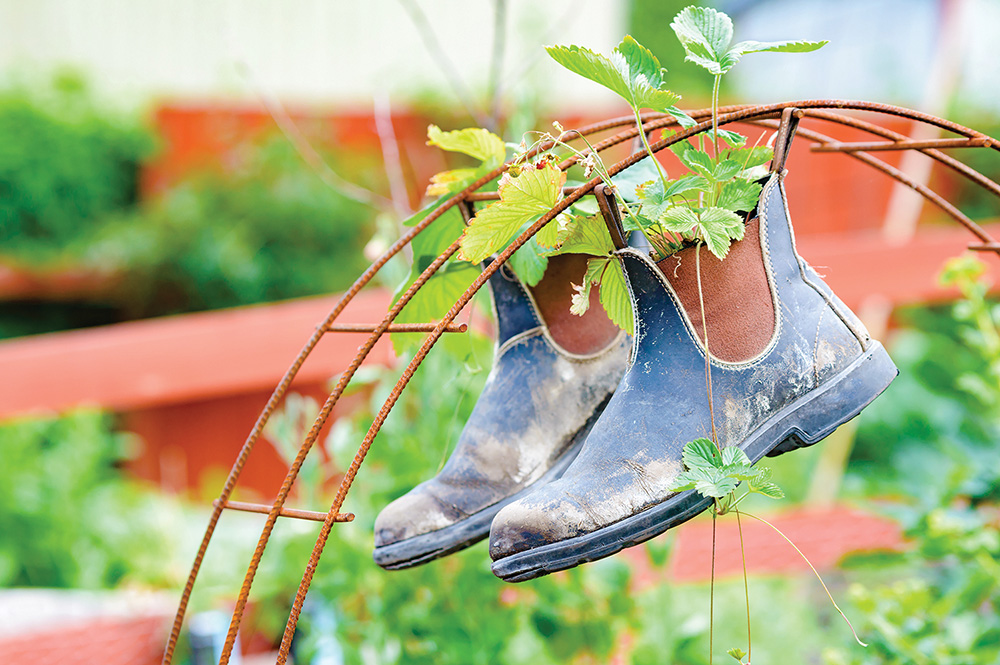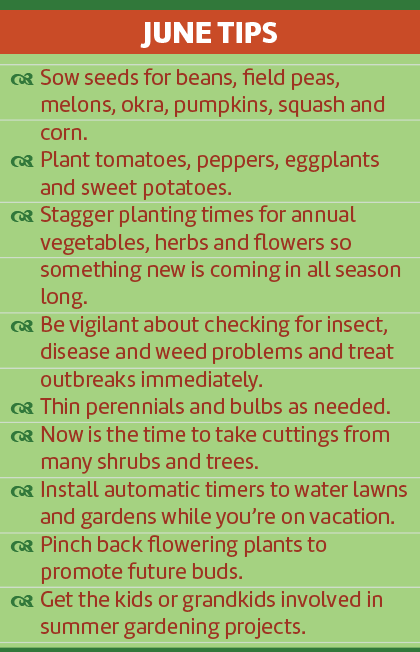
Gardening hacks — or creative ways to save time and money in the garden — can be fun and often effective shortcuts for many gardening chores. If used correctly, garden hacks can also help us create more eco-friendly gardens, especially if we concentrate on the three Rs of sustainability: recycling, reusing and repurposing.
Recycle
Many items that we might throw in the trash or send to our local recycling center can be useful tools in the garden. Here are a few ways to turn trash into garden treasure.
Yogurt cups and other small plastic cartons make great seed-starting containers. Emptied milk, water, soda and juice containers can be used as plant covers, plant collars and as mini greenhouses or terrariums. Those with handles are perfect for use as watering and dusting devices or as scoops for potting soil and birdseed.
Old newspapers and cardboard can be laid in garden beds to control weeds and retain moisture in the soil.
Empty wine bottles can be filled with water, then pushed upside down into a pot to slowly irrigate container plants. They are also a great source for garden art and ornamentation — think bottle trees or a garden bed bordered with upturned bottles.
Reuse
Lots of things can be reused in the garden — old boots can become planters and old pallets can become tool racks — but there are few things as valuable to a garden as kitchen waste. Yes, it makes great compost, but here are a few other uses for it, too.
Eggshell halves make cute, biodegradable seed-starting containers and can be crushed and sprinkled around plants to keep away slugs and add calcium to the soil.
Banana peels, which are high in potassium and other plant nutrients, can be added to compost or chopped or dried and added to garden soil as a slow-release fertilizer. They can also help ward off aphids.
Used coffee grounds can be sprinkled around plants to tamp down fungal diseases, provide a slow-release source of nitrogen to plants and improve soil texture. (A word of caution: coffee is acidic, so used grounds are not recommended for plants that require more alkaline conditions.)
Repurpose
Many of the household products we use every day in the home are also useful in the garden to control pests, add nutrients to the soil and in other ways. Here are a few examples. 
Baking soda can help fight fungal problems on flowers and shrubs and can help sweeten the taste of tomatoes.
Concoctions of vinegar, baking soda, dish soaps, vegetable oils and other products can be used in place of stronger chemicals to remove and thwart a variety of pests.
Mixtures made of ingredients such as hot peppers, garlic and water can be misted on to plants to deter aphids, and jar caps filled with beer can trap and kill slugs, snails and some flying insects.
These are just a few of the hundreds, maybe thousands, of gardening hacks that make gardening easier, cheaper, sustainable and more fun. Additional details for these and other ideas are available in gardening publications, online and through local garden experts (one great book of ideas is 101 Organic Gardening Hacks: Eco-friendly Solutions to Improve Any Garden by Shawna Coronado). Do a little poking around to find ones that suit your needs.
A word of caution, though: not all hacks are effective or safe, so if you have questions or concerns, seek advice from your local Cooperative Extension or Master Gardener organizations or other professional gardening sources, especially before applying any potentially toxic or unsafe products to your garden.
Katie Jackson is a freelance writer and editor based in Opelika, Alabama. Contact her at [email protected].




